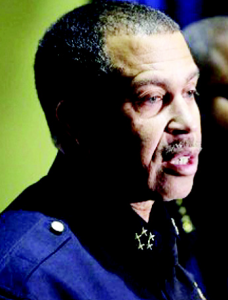by Joseph P. Tartaro | Executive Editor
If more citizens were armed, criminals would think twice about attacking them, Detroit Police Chief James Craig said on Jan. 2.
According to the Detroit News, urban police chiefs are typically in favor of gun control or reluctant to discuss the issue, but Craig was candid about how he’s changed his mind. His views also seem to track those recently expressed by the chief of Interpol.
“When we look at the good community members who have concealed weapons permits, the likelihood they’ll shoot is based on a lack of confidence in this Police Department,”
Craig said at a press conference at police headquarters, adding that he thinks more Detroit citizens feel safer, thanks in part to a 7% drop in violent crime in 2013.
Craig said he started believing that legal gunowners can deter crime when he became police chief in Portland, ME, in 2009.
“Coming from California (Craig was on the Los Angeles police force for 28 years), where it takes an act of Congress to get a concealed weapon permit, I got to Maine, where they give out lots of CCWs (carrying concealed weapon permits), and I had a stack of CCW permits I was denying; that was my orientation.
“I changed my orientation real quick. Maine is one of the safest places in America. Clearly, suspects knew that good Americans were armed.”
The newspaper reported that Craig’s new statements echoed those he made Dec. 19 on “The Paul W.
Smith Show” on WJR (760 AM), when he said: “There’s a number of CPL (concealed pistol license) holders running around the city of Detroit. I think it acts as a deterrent. Good Americans with CPLs translates into crime reduction. I learned that real quick in the state of Maine.”
As might be expected, Robyn Thomas, director of the Law Center to Prevent Gun Violence in San Francisco, disagreed, according to the Detroit newspaper.
Rick Ector of the Firearm Academy of Detroit, which teaches gun safety classes, said Craig’s comments are unusual for a police official.
“It’s a huge, radical departure for the police chief to say good people should have access to firearms,” said Ector. “I’m not ready to say he’s progun just yet, but it’s vastly different from what police chiefs have said in the past.”
Michigan Association of Chiefs of Police director Robert Stevenson agreed.
“A lot of police officers have no problem at all with law-abiding citizens having guns,” Stevenson said.
“I think it’s probably like the citizenry: Some are for it, some are against it. But most police chiefs don’t want to talk about the subject.
“It’s a divisive issue, and a lot of times chiefs are reluctant to get in the middle of those debates. Gun control, the death penalty—most chiefs try to stay out of those discussions.
Craig speaks his mind; you’ve got to give him credit for that.”
According to a March 2013 anonymous poll of 15,000 officers by the law enforcement website policeone.com., almost 90% of the respondents believed casualties would be decreased if armed citizens were present during shooting incidents, while more than 80% supported arming teachers who were trained with firearms.
Although Craig said more responsible gun owners would likely lower crime, in the past he also has called for a ban on assault weapons, regulating high-capacity magazines, tighter restrictions on Internet ammunition sales and more stringent background checks for merchants who sell firearms at gun shows.




